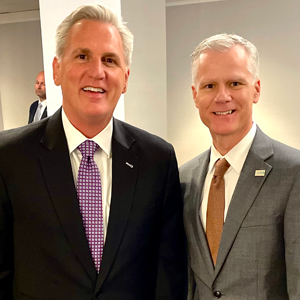Situational Awareness
The House and Senate are both in session this week and all eyes are on whether the votes will materialize for a debt limit deal reached over the weekend. Both chambers will be in session until breaking for the Independence Day recess on June 23, returning July 11.
SCOTUS Decision on Sackett v. EPA
Last week, the Supreme Court of the United States (SCOTUS) released its opinion on Sackett v. EPA, which challenged key components of the Waters of the United States (WOTUS) definitions as part of the Clean Water Act. NCA issued a member alert shortly after the opinion was released. The 9th Circuit of Appeals decision was overturned 9-0, though the majority opinion was supported 5-4. The majority opinion holds three key points:
- The Clean Water Act “extends only to those wetlands that are as a practical matter indistinguishable from waters of the United States.”
- For wetlands to be under the jurisdiction of WOTUS, they must:
- Be adjacent to a relatively permanent body of water connected to traditional interstate navigable waters and
- Have a continuous surface connection with that water, making it difficult to determine where the water ends and the wetland begins.
- Waters of the United States (WOTUS) are therefore:
- Traditional interstate navigable waters.
- Relatively permanent bodies of water connected to traditional interstate navigable waters.
- Wetlands that have a continuous surface connection with either of the above.
The SCOTUS decision raises a number of questions about the future of the recently implemented WOTUS rule changes and effectively nullifies the “significant nexus” test used as a predicate for the EPA claiming jurisdiction over bodies of water. While the recent WOTUS rule went into effect in March, preliminary injunctions have prevented the rule from being effective in 27 states. NCA will continue to stay on top of this issue and alert members to any judicial, legislative or regulatory developments.
Debt Limit Focus of Week
Lifting the country’s debt limit is the main focus of the House and Senate this week. After intense negotiations, President Biden and House Speaker Kevin McCarthy (R-Calif.) reached an agreement over the weekend that would lift the ceiling until January 1, 2025 and set spending limits for the next two years. While initial estimates pegged a potential default date of June 1, Treasury Secretary Janet Yellen dispatched a letter to the Hill that the U.S. is at risk of default if the limit isn’t increased by June 5. The four additional days are critical to Congress completing its work on the legislation as the House has a rule that legislation must be available for 72 hours prior to a vote. A vote on the debt ceiling is scheduled for Wednesday, May 31 in the House and will be taken up by the Senate shortly after. Its passage is not a forgone conclusion as there are groups on the left and right opposing the package.

I was able to have lunch with House Speaker Kevin McCarthy (R-Calif.) the day after negotiations began with the White House. The debt limit was the main topic of conversation, but we had a little time to talk about what’s going on with clubs.
The debt limit agreement includes a number of extraneous measures. Among them are:
- Cap reductions of 1% during continuing resolutions.
- Funding for Veterans’ Affairs Toxic Exposure Fund.
- Rescission of unspent COVID-19 relief.
- Rescind $1.39 billion of $80 billion increase to the Internal Revenue Service.
- Imposition of work requirements for welfare under Temporary Assistance for Needy Families (TANF) and food stamps under the Supplemental Nutritional Assistance Program (SNAP).
- Permitting reform.
- Student loan payment suspensions–not allowed after June 30 unless authorized by Congress.
As noted, left and right factions have come out in opposition to the deal, though Senate Minority Leader Mitch McConnell (R-Ky.) has stated he is in support of the measure and urged quick passage.


